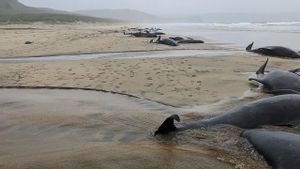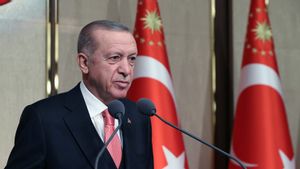JAKARTA - Wildlife and natural habitats in Abu Dhabi, United Arab Emirates (UAE) are getting extra protection through a new policy from the country's Environment Agency.
Al Saadiyat Marine National Park and Mangrove Marine National Park are two areas covered under the latest Protected Areas Policy issued by Sheikh Hamdan bin Zayed, Ruler Representative in Al Dhafra Region and chairman of the Abu Dhabi Environment Agency.
The Houbara Protected Area in Al Dhafra and the coral reefs in the Al Yasat Marina Protected Area are also included.
Projects and activities in or near these areas will require an environmental impact study and license from the agency under this new policy.
Its aim is to protect the nature reserves that make up the Sheikh Zayed Protected Area Network, preserving the emirate's cultural and natural heritage.
It is known that marine reserves cover 14 percent of the total aquatic biome in the emirate. Meanwhile, terrestrial nature reserves cover 17 percent of the land area.
Al Saadiyat itself has a thriving habitat, home to the endangered hawksbill turtle. Meanwhile, the Mangrove Park is home to millions of mangrove trees that support a thriving ecosystem.
This new policy was issued after President Sheikh Mohamed declared 2023 as the UAE's Year of Sustainability.
"The issuance of a protected area policy in Abu Dhabi, the first in the UAE, aims to strengthen and expand the protected area network in the emirate to keep pace with rapid urbanization and development efforts, climate change, and increasing pressure and demand for natural resources and sustainable development," said Dr. Shaikha Salem Al Dhaheri, general secretary of the agency, reported by The National News, July 20.
This will enhance ecotourism opportunities and preserve the aesthetic value of Abu Dhabi's landmarks and land and sea landscapes, she said.
Dr. Al Dhaheri continued, this is also in line with the UAE's sustainability goals and the protection of natural resources, as well as the preservation of biodiversity, important habitats and species.
Protected areas in Abu Dhabi offer investment opportunities that can contribute to the local economy, supporting the health and happiness of residents.
Meanwhile, Habiba Al Marashi, chairman of the Emirates Environmental Group, welcomed this new policy.
This "very strong step" shows the authorities recognize the importance of environmental issues as well as economic development, he said.
"The issuance of this kind of law sends a strong message to all 'players' on the ground as well as internationally, the UAE is serious about its sustainability strategy and wants to play a very responsible role not only at the national level but also at the global level," she explained.
Policy enforcement is key, with the passing of new laws as the first step, he said.
"You must have qualified people to monitor and ensure the implementation of this policy, because law enforcement is very important. This is an ongoing process," she said.
اقرأ أيضا:
The agency said the policy would help protect and manage biodiversity and habitats, and enhance the emirate's ability to adapt to climate change.
"The scope of this policy covers all types of present and future reserves, in both terrestrial and marine ecosystems, including all national parks, wetlands, and biosphere reserves," said Ahmed Al Hashemi, executive director of the agency's terrestrial and marine biodiversity sector.
This also applies to "areas located in the vicinity of established reserves boundaries," it added, as "any activity or project in these specific areas may impact the environmental elements of the reserve".
The English, Chinese, Japanese, Arabic, and French versions are automatically generated by the AI. So there may still be inaccuracies in translating, please always see Indonesian as our main language. (system supported by DigitalSiber.id)

















